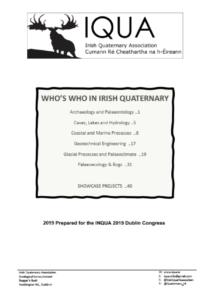The Royal Irish Academy (RIA) Committee for Quaternary Research in Ireland was established in 1934, providing a key stimulus for the study of Ireland’s Quaternary history. In the 1970s, the Irish Quaternary Association (IQUA) was founded with a view to co-ordinating and energising all aspects of Quaternary research in Ireland and passing on existing expertise through conferences and especially field excursions.
 Currently, IQUA has well over 100 members and disseminates information about its activities through its webpage and email list. Learn more about our Irish Quaternary community through our Who’s Who published for the INQUA Congress in 2019.
Currently, IQUA has well over 100 members and disseminates information about its activities through its webpage and email list. Learn more about our Irish Quaternary community through our Who’s Who published for the INQUA Congress in 2019.
IQUA hosts at least two symposia and one field-based meeting each year. The Spring Meeting invites presentations on any area of new or ongoing research of interest to Quaternary scientists, particularly from current postgraduate students, and is followed by the Annual General Meeting of the Association.
IQUA’s Annual Symposium is held in late November. This is a thematic one-day meeting to which we invite keynote speakers from home and abroad, attracting an audience of 80-100 people. Emphasis is placed on multi-disciplinary approaches so that there is always something of interest for the wide range of disciplines – geomorphology, palaeoecology, archaeology, amongst others – that IQUA serves.
IQUA have a long tradition of running field excursions and producing fieldguides that have become an important part of Quaternary science literature. The field meetings originated as part of the 1977 INQUA Congress held in Birmingham and also because work by Marshall McCabe, Frank Mitchell, Francis Synge, and Bill Watts was achieving international scientific interest. The popularity of the IQUA excursions is exemplified with attendance by more than half of the membership in recent years.

